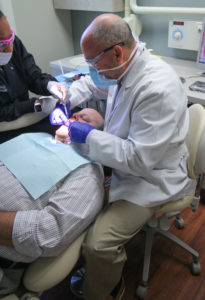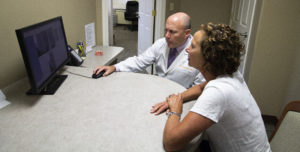Many of us find ourselves clenching our teeth occasionally, especially when we’re feeling anxious or stressed out, but did you know that 1 in 5 adults spend a significant part of every day grinding their teeth without even realizing it? Whether it’s during daylight hours or an issue that tends to happen overnight, teeth grinding is something we see a lot of here at Scott Edwards DDS. While it’s a relatively common occurrence, it can lead to a number of dental issues, from wear and tear to headaches and jaw pain. We’re dedicated to helping our patients have the brightest, healthiest smile possible, so let’s take a look at what bruxism is, some of the problems it can cause, and how we can help resolve them!
The basics of bruxism
The technical term for teeth grinding is bruxism. It describes any involuntary and excessive grinding, clenching, or rubbing of the teeth outside of normal chewing, swallowing, or speaking movements. When it occurs during the day, we refer to it as diurnal, and if it happens at night, it is considered to be nocturnal. Although we don’t know the exact reason bruxism develops, it has both physical and psychological causes linked to it.
Sleep difficulties
This is one of the most common issues associated with teeth grinding. About a quarter of all people with obstructive sleep apnea experience also experience sleep bruxism. Bruxism may also be related to gastroesophageal reflux disease, or GERD, another sleep-related ailment. Chronic snoring and sleep talking may play a role in developing bruxism as well.
Stress and anxiety
As we’ve mentioned, anxiety and stress are two of the biggest contributors to teeth grinding. If you’re a naturally anxious person, or experiencing any kind of external stressor that has caused a noticeable increase in your teeth grinding, it can help to explore various methods of stress relief for relief, including relaxing music, a long walk, or a warm bath before bed.
Malocclusions
Although this is more likely in children, plenty of adults still have problems with misalignment in the teeth and jaw that can cause teeth grinding. Experienced dentists like Drs. Edwards, Prince, and Groshart are trained to recognize these orthodontic issues and recommend treatment for them. In some cases, we can even correct malocclusions here in our office by using the Invisalign clear aligner system!
Medications and medical conditions
There are certain medications and medical conditions for which bruxism can be a side effect, particularly neurological conditions.
Genetics
Teeth grinding is an inheritable condition. If others in your family have suffered from bruxism in the past, you are more likely to develop it as well.

Some possible effects of teeth grinding
Although bruxism is not considered a dangerous disorder, it can still have a negative effect on your oral health and your overall well-being. Some of the difficulties you may experience in conjunction with repetitive teeth grinding can include:
Damaged tooth enamel
Grinding your teeth over time can wear down the enamel, the hardest substance in our bodies. Once the enamel is worn down significantly or worn through completely, the inner soft core of the tooth will be exposed. This is called the dentin, and it’s where the nerve endings are located. Because the dentin is much softer than enamel, once it is exposed, your teeth will wear down much more rapidly.
Interrupted sleep
Although we touched on this above, it’s worth noting that bruxism is actually classified as a sleep disorder! This is because it often disrupts restful sleep. Waking up multiple times at night can be hard on the body, brain, and emotions. Whatever the underlying cause of bruxism, patients who have spent a night grinding their teeth may awake in the morning feeling unrested, and can also suffer from headaches, neck, and jaw pain.
Behavioral issues
This can go hand in hand with less sleep. Clinical studies have demonstrated an association between bruxism, a lack of quality sleep, and the anxiety, stress, and depression in those who suffer from both.
Aches and pains
Patients who experience prolonged teeth grinding may find themselves dealing with headaches, ear aches, jaw pain, or even damaged teeth. This can take a toll on oral health, and can also negatively impact the overall quality of life if left untreated.
Prevention and treatment for teeth grinding with Scott Edwards DDS
Whether bruxism is a known problem for you, or something you merely suspect, we encourage you to contact our experienced team here at Scott Edwards DDS. Our doctors will be able to conduct a thorough examination of your teeth and determine if the grinding is causing any damage. If no damage is apparent, it’s likely no further treatment will be recommended.

However, if we do notice any problems related to bruxism, we’ll be able to provide you with several options for helping to reduce the amount of grinding and prevent any further damage. We can also treat any damage that is already present. This often involves treating any obvious underlying causes, such as reducing stress and anxiety, along with more proactive treatment, like a mouthguard made specifically for your teeth.
If you’re in Memphis or the surrounding communities and struggling to have a productive day or get a good night’s sleep due to your bruxism, our skilled staff can help you rest better and smile brighter! We have years of experience treating families from all over the Mid-South, and with two conveniently located offices to choose from, we’re never too far from where you are. Get in touch with us today and let us help protect your smile!
